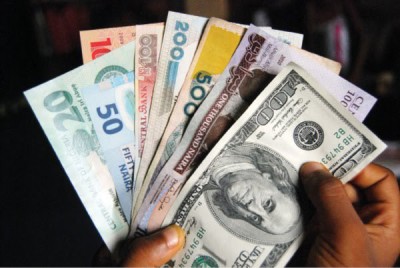
There is need for the Buhari administration to unfold a coherent economic agenda
The naira, which has been volatile, tumbled further significantly at the parallel market recently, hitting N400 against the dollar as foreign exchange scarcity continues to batter the economy. Even though the Nigerian currency reversed some of the significant losses in recent days, Forex dealers and financial experts believe the unpredictable nature of the currency is hurting the economy very badly and that the authorities need to do something about it quickly.
Perhaps some of the major cause-effects of the knocks are the plunging oil prices, the war in the Northeast against the brutal Boko Haram terror sect and messy pre-election politics. These have set the stage for a rough time for the national currency that has become vulnerable to all manner of forces. Added to this is the fact that Nigeria, Africa’s largest economy, relies mostly on oil exports for government revenues and has been hit badly as crude prices fell to a 12-year low of below $30 a barrel before the recent recovery to around $40 per barrel. To worsen matters was the recent 18 per cent plunge in the local stock market.
With the collapse of oil prices, it is not surprising that the naira has become a prime candidate for attacks by speculators. The situation is compounded by the growing reality that there is very little ammunition to defend the currency, as data from the Central Bank of Nigeria (CBN) reveals its liquid reserves have declined to $27.21 billion from over $40 billion by this time in 2014. It is preposterous that we were running down our war chest of foreign reserves in the era of high oil prices only to start panicking in the face of dwindling prices.
Meanwhile, the debate continues to rage between proponents and opponents of devaluation of the naira on how it will affect the diversification of the productive base of the economy, unemployment, inflation and export promotion. While the pro-devaluation divide wants us to believe that it will save the naira from speculative attacks and eradicate round tripping by making the dollar available to only genuine imports, the anti-devaluation divide counters that this will lead to industry closures, worsening unemployment and hyper-inflation. CBN’s response has been at best knee jerk, sending more panic across the system.
What is particularly worrying is the underhand manner and lack of transparency surrounding the forex fiasco. For instance, we understand the Bankers’ Committee was recently directed by the CBN to apply the parallel market rate for their customers to discourage people from using their ATM cards abroad. But that has not only created a lot of distortion, racketeering and fraud, it has also engendered uncertainties that do not help in any serious business environment.
President Buhari has consistently stated his opposition to the devaluation of the naira. What is missing, however, is a clearly thought out and articulate strategy to pull the country out of an imminent economic crisis. Yet, as we have consistently argued on this page, there is need for the administration to unfold a coherent economic agenda. Against the background that we are dealing with a huge country where people and businesses need to plan, project and rely on consistent economic policies, it is evident that the current handling of the economy is not benefiting from the pool of talents that is richly available in Nigeria.
At a time the country is in an economic mess that demands clear direction and competent hands, the CBN cannot be left alone to continue to be in charge of fiscal, trade and monetary policies, all at the same time. Therefore, it is important for President Buhari to assemble an economic team quickly so that his administration can begin to arrest what has become a slide not only for the naira but, indeed, the entire economy.

0 comments